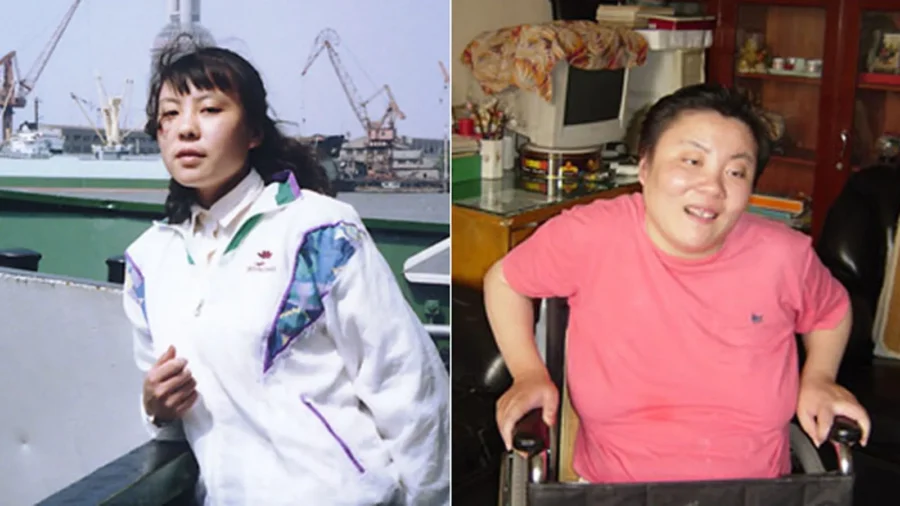A woman who was left incapacitated for decades after being poisoned as a college student in a high-profile cold case in China has died at the age of 50.
Zhu Ling died in Beijing on Friday, her alma mater Tsinghua University announced in a post on the Chinese social media platform Weibo, which has been flooded with condolences.
“Zhu Ling has fought tenaciously against the pain for many years. Throughout Zhu Ling’s life, she has always had care, support and encouragement from many alumni, different communities and the school,” wrote the prestigious Beijing-based university, often called “China’s MIT,” in the Saturday post.
Ms. Zhu’s death on Friday evening was also confirmed by her father Wu Chengzhi to the Southern Metropolis Daily, the news outlet reported Saturday. She would be buried in Beijing, he was quoted as saying. A funeral for Zhu was held in Beijing Sunday, state-affiliated Jimu News reported.
In 1994, Ms. Zhu was a second-year chemistry major and accomplished musician at Tsinghua, when she began to experience stomach pain, hair loss, and other seemingly inexplicable symptoms that were later found to be signs of thallium poisoning, state media outlets have previously reported.
The highly toxic chemical—used in rodent and insect poisons—left Ms. Zhu practically blind and with the mental capacity of a 6-year-old.
She had suffered for months and ultimately fell into a coma before the cause of her ailment was diagnosed. Despite suspicion of foul play and a police investigation, no one has ever been charged.
Ms. Zhu’s case has captured the attention of the country across the decades since she was poisoned, sparking outrage and calls for justice. On Saturday, her death was the top search item on Weibo, with more than 400 million views by Saturday afternoon, as grief poured in from Chinese internet users.
“When [I] think of her unpredictable ordeal lingered on for 30 years, the hardship beyond words, and the lack of justice, [I] felt a sense of anger that cannot be tamed,” wrote Yan Feng, a linguistics professor from Fudan University who has 5.5 million followers on Weibo. “May the deceased rest in peace and the living be in calmness.”
“The girl who loved the guqin has left us like this, I wish her a good journey! There will be no more pain in heaven!” said another comment with more than 10,000 likes, referring to a Chinese musical instrument Ms. Zhu played.
An Inconclusive Investigation
Other social media users Saturday focused on the Chinese authorities’ fruitless investigation and past accusations that the probe may have been dropped due to the powerful connections of a former suspect’s family. Their comments echoed calls for accountability in the case that have flared periodically in China.
“The main reason that Zhu’s case evokes so much public anger and sympathy is because many people in China see a piece of themselves in Zhu: They have suffered injustice of some sort, but there is never a fair, independent or transparent investigation by the authorities,” said Yaqiu Wang, research director for China at the Washington-based non-profit Freedom House.
“Zhu’s devoted parents, who took great care of her for nearly three decades, also symbolize the familial care that people in China intimately know and have to rely on, because the system is not something you can trust and depend upon.”
Rights groups have long criticized political influence over China’s notoriously opaque justice system, even as Beijing says it maintains—and has strengthened—rule of law.
Following the poisoning, police had investigated one of Ms. Zhu’s roommates, Sun Wei, but subsequently cleared her as a suspect, according to previous reporting from state news agency Xinhua.
Many netizens in the past have linked the uneventful probe to Ms. Sun’s family background.
In 2013, when a fatal poisoning case at a Shanghai college dorm in April rekindled national interest, social media users launched a petition to the U.S. government calling for it to take action against the former suspect, who they believed to be residing in the country.
Ms. Sun’s grandfather was a high-ranking official in the Nationalist government before the communist takeover of China in 1949. He later held senior—though largely symbolic—positions in the People’s Republic until his death in 1995.
One of Ms. Sun’s father’s cousins was considered a national leader from 1993 to 2003 when he was a vice-chairman of the China’s top political advisory body.
Ms. Sun has reportedly made a few online statements on Tianya, a Chinese Internet discussion forum, over the years, including one in 2005, in which she said police cleared her as a suspect in 1998 due to lack of evidence.
Ms. Sun, who state media has reported had access to thallium in the university laboratory, said she was not the only student with access to the toxic substance and denied personal animosity between herself and Ms. Zhu. Addressing her family’s political connections, she said her grandfather had died by the time she was questioned.
In 2006, Ms. Sun said her family had submitted an application to the police on her behalf requesting the authorities reopen the investigation to “find the truth.”
In 2013, when the Shanghai case piqued public interest again over Ms. Zhu’s case, Ms. Sun resurfaced on the Tianya platform and wrote: “I, more than anyone else, would like to bring the real perpetrator to justice.”
The-CNN-Wire
™ & © 2023 Cable News Network, Inc., a Warner Bros. Discovery Company. All rights reserved.

